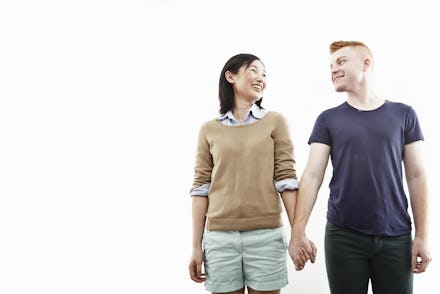The One Racial Group That Has a Major Advantage in Online Dating

The news: The great promise of online dating is that it's supposed to offer an even playing field: No matter who you are, if you showcase your true personality and put yourself out there, you can find someone to connect with.
But as in real life, some people have a natural advantage in the online dating world.
A new study conducted by University of Massachusetts-Amherst has found that despite dating websites' insistence that your personality and interests determine your matches, when it comes to initial interactions, race plays a big part in who decides to contact you.
After analyzing 6.7 million initial messages sent between opposite gender partners at "one of the largest dating websites in the United States," the researchers identified three distinct groups that benefited from their racial background — and all of them were multi-racial. Of the three, Asian-white women tended to be viewed most favorably.
"Asian-white women were viewed more favorably than all other groups by white and Asian men, while Asian-white and Hispanic-white men were also afforded 'bonus' status by Asian and Hispanic women respectively," reports the American Sociological Association.
Unfortunately, racism in dating is nothing new. Back in 2009, OkCupid made waves by releasing its users' racial data, which revealed that white men and Asian women had an advantage, while black users — male or female — received the lowest rates of response from other races.
The Facebook app "Are You Interested" found similar data in 2013 that revealed while black women responded the most to messages, they — along with black men — received the least initial contacts. "All women except black women are most drawn to white men, and men of all races (with one notable exception) prefer Asian women," reported NPR at the time.
And even for the people who enjoy this advantage, it is demeaning. While Asian and multiracial women may have the benefit of being contacted by interested suitors, the fact remains that their race plays a big factor and, in fact, they are being reduced to fetishized caricatures.
"A preference for multiraciality is closely akin to a preference for lightness or whiteness," explained Celeste Vaughan Curington, who led the UMass study. "Daters may be influenced by the popular media's representation of mixed-race people as 'exotic' and sexually appealing."
Or, as NPR journalist Kat Chow put it: